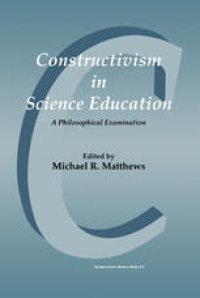
Ebook: Constructivism in Science Education: A Philosophical Examination
- Tags: Science Education, Philosophy of Science, History, Interdisciplinary Studies, Mathematics Education
- Year: 1998
- Publisher: Springer Netherlands
- Edition: 1
- Language: English
- pdf
Constructivism is one of the most influential theories in contemporary education and learning theory. It has had great influence in science education. The papers in this collection represent, arguably, the most sustained examination of the theoretical and philosophical foundations of constructivism yet published.
Topics covered include: orthodox epistemology and the philosophical traditions of constructivism; the relationship of epistemology to learning theory; the connection between philosophy and pedagogy in constructivist practice; the difference between radical and social constructivism, and an appraisal of their epistemology; the strengths and weaknesses of the Strong Programme in the sociology of science and implications for science education. The book contains an extensive bibliography.
Contributors include philosophers of science, philosophers of education, science educators, and cognitive scientists. The book is noteworthy for bringing this diverse range of disciplines together in the examination of a central educational topic.
Constructivism is one of the most influential theories in contemporary education and learning theory. It has had great influence in science education. The papers in this collection represent, arguably, the most sustained examination of the theoretical and philosophical foundations of constructivism yet published.
Topics covered include: orthodox epistemology and the philosophical traditions of constructivism; the relationship of epistemology to learning theory; the connection between philosophy and pedagogy in constructivist practice; the difference between radical and social constructivism, and an appraisal of their epistemology; the strengths and weaknesses of the Strong Programme in the sociology of science and implications for science education. The book contains an extensive bibliography.
Contributors include philosophers of science, philosophers of education, science educators, and cognitive scientists. The book is noteworthy for bringing this diverse range of disciplines together in the examination of a central educational topic.